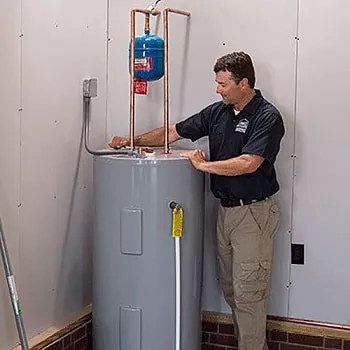Fast and Reliable Pipe Repair to Resolve Leaks and Reestablish Functionality
Wiki Article
Full Overview to Water Heating SystemInstallment and Replacement
Recognizing the details of hot water heater setup and substitute is critical for house owners seeking to guarantee effectiveness and reliability in their warm water supply. From choosing the ideal type and dimension to carrying out a seamless installment procedure, a number of factors must be considered to avoid usual risks. This overview will certainly offer you with the necessary actions and insights to browse the intricacies of this home improvement task, while likewise stressing vital maintenance techniques that can extend the life of your system. As you discover these facets, you may locate on your own reassessing your current arrangement and identifying areas for renovation.Types of Water Heating Units
When thinking about water heating unit installation and substitute, it is vital to comprehend the various sorts of hot water heater readily available on the market. One of the most typical types consist of storage tank hot water heater, tankless hot water heater, heat pump water heating systems, and solar hot water heater.Tank water heating systems are traditional systems that save a particular volume of warm water, making them readily available when required. In comparison, tankless water heaters provide warm water on demand, eliminating the need for storage.
Heatpump water heating systems make use of electrical power to transfer warm from the air or ground to warmth water, using considerable energy financial savings however needing more space and specific installation problems. Solar water heating units harness solar energy to heat water, giving an eco-friendly option with possible lasting price financial savings, although they often require a backup system for cloudy days.
Comprehending these alternatives makes sure notified decisions regarding installment and substitute, catering to specific demands and choices.
Choosing the Right Dimension
Choosing the suitable size for a water heater is essential to ensure optimum performance and efficiency. A device that is as well small will certainly battle to satisfy home demands, leading to inconsistent warm water availability and increased power usage. On the other hand, an oversized hot water heater can lead to unneeded power waste and higher utility expenses.To determine the right size, take into consideration the family's peak warm water usage. This can be determined based on the number of owners and their common warm water requirements. A family of 4 may call for a water heating unit with a capacity of 50 to 80 gallons, depending on the use patterns, such as simultaneous showers and washing.
In addition, examine the recovery price, which measures just how swiftly a heater can restore warm water after it has been made use of. For tankless designs, concentrate on the flow rate, gauged in gallons per min (GPM), to guarantee it meets the house's synchronised need.

Installation Process Overview

Following, the old system should be disconnected and gotten rid of, taking treatment to adhere to regional codes and policies concerning disposal. When the old unit is out, the new hot water heater can be positioned in position. This step entails linking the supply of water lines, making certain that all fittings are safe and secure and leak-free.
After developing water connections, it's important to attach the power supply, whether electric or gas, complying with the manufacturer's directions meticulously. When all links are made, the system should be filled up with water, and the power can be transformed back on. Finally, it is very important to look for leaks and make certain the water heating unit is operating correctly before finishing the installment process.
Typical Installment Errors

Another regular mistake is disregarding to comply with neighborhood codes and guidelines. Failing to stick to these requirements can not only bring about safety dangers but might also lead to costly fines or the demand for costly reinstallation. Additionally, incorrect airing vent is a critical concern. Inadequate air flow can trigger harmful gas accumulation, posing major wellness threats.
Stopping working to protect connections or using the incorrect kind of fittings can lead to leakages and browse this site water damages. By preventing these common setup blunders, property owners can ensure their water heating system operates safely and effectively, taking full advantage of efficiency and durability.
Upkeep Tips for Durability
Correct upkeep of a hot water heater is vital for its longevity and ideal performance. Routine evaluations and maintenance can avoid pricey repair work and expand the home appliance's life-span. Begin by inspecting the temperature level setting; it must generally be established between 120 ° F and 140 ° F for ideal power efficiency and safety and security.Every six months, flush the container to remove debris build-up, which can impair home heating performance and cause rust. To do this, shut off the heater, link a hose to the drain shutoff, and let the water run up until it is clear.
Anode poles should be checked each year and replaced when they are rusted. These rods assist stop container corrosion by drawing in destructive components in the water.
Furthermore, inspect the pressure relief shutoff consistently to ensure it is working properly. This shutoff is essential for preventing excessive pressure accumulation within the storage tank.
Finally, take into consideration setting up a professional upkeep check every couple of years for comprehensive evaluations and servicing. By adhering to these maintenance suggestions, homeowners can considerably enhance the effectiveness, security, and life expectancy of their hot water heater, making certain trusted warm water for years ahead.
Final Thought
Finally, appropriate setup and maintenance of hot water heater are vital for ensuring efficiency and long life (gas leak repair). Choosing the appropriate kind and dimension, adhering to installation standards, and preventing usual errors considerably add to optimum performance. Regular upkeep checks and expert servicing aid suffer performance and prevent pricey repair services. By comprehending these crucial facets, house owners can accomplish a dependable warm water supply while minimizing possible problems related to hot water heater operation.Recognizing the complexities of water heating system installation and replacement is crucial for homeowners looking for to guarantee effectiveness and integrity in their hot water supply.Storage tank water heaters are standard systems that save a specific volume of warm water, making them conveniently available when needed. In contrast, tankless water heating units give hot water on need, removing the need for storage. Choosing a water heating system find out that is either too little or as well huge can lead to inefficiencies, resulting in poor hot water supply or extreme energy usage.
By comprehending these crucial aspects, property owners can achieve a trustworthy warm water supply while decreasing possible concerns associated to water heating system procedure. drain cleaning.
Report this wiki page